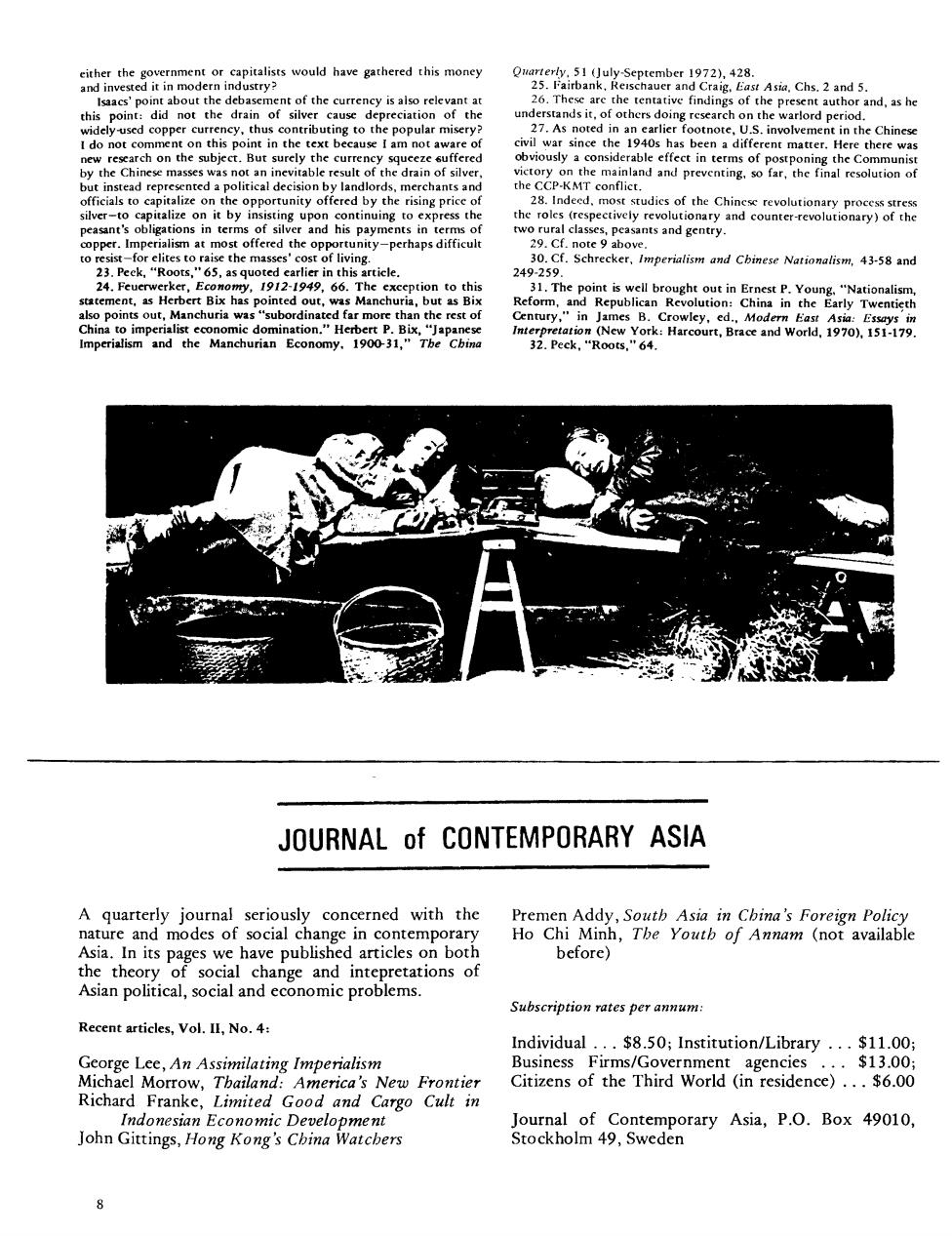正在加载图片...

either the government or capitalists would have gathered this money Ouarterly,51 (July-September 1972),428. and invested it in modern industry? 25.Fairbank,Reischauer and Craig,East Asia,Chs.2 and 5. Isaacs'point about the debasement of the currency is also relevant at 26.These are the tentative findings of the present author and,as he this point:did not the drain of silver cause depreciation of the understands it,of others doing research on the warlord period. widely-used copper currency,thus contributing to the popular misery? 27.As noted in an earlier footnote,U.S.involvement in the Chinese I do not comment on this point in the text because I am not aware of civil war since the 1940s has been a different matter.Here there was new research on the subject.But surely the currency squeeze suffered obviously a considerable effect in terms of postponing the Communist by the Chinese masses was not an inevitable result of the drain of silver. victory on the mainland and preventing,so far,the final resolution of but instead represented a political decision by landlords,merchants and the CCP-KMT conflict. officials to capitalize on the opportunity offered by the rising price of 28.Indeed,most studics of the Chinese revolutionary process stress silver-to capitalize on it by insisting upon continuing to express the the roles (respectively revolutionary and counter-revolutionary)of the peasant's obligations in terms of silver and his payments in terms of two rural classes,peasants and gentry. copper.Imperialism at most offered the opportunity-perhaps difficult 29.Cf.note 9 above. to resist-for elites to raise the masses'cost of living. 30.Cf.Schrecker,Imperialism and Cbinese Nationalism,43-58 and 23.Peek,"Roots,"65,as quoted earlier in this article 249-259. 24.Feuerwerker,Economy,1912-1949,66.The exception to this 31.The point is well brought out in Ernest P.Young,"Nationalism, statement,as Herbert Bix has pointed out,was Manchuria,but as Bix Reform,and Republican Revolution:China in the Early Twentieth also points out,Manchuria was "subordinated far more than the rest of Century,"in James B.Crowley,ed.,Modern East Asia:Essays in China to imperialist economic domination."Herbert P.Bix,"Japanese Interpretation (New York:Harcourt,Brace and World,1970),151-179. Imperialism and the Manchurian Economy.1900-31,"The Cbina 32.Peck,“Roots,"64. JOURNAL of CONTEMPORARY ASIA A quarterly journal seriously concerned with the Premen Addy,South Asia in China's Foreign Policy nature and modes of social change in contemporary Ho Chi Minh,The Youth of Annam (not available Asia.In its pages we have published articles on both before) the theory of social change and intepretations of Asian political,social and economic problems. Subscription rates per annum: Recent articles,Vol.II,No.4: Individual...$8.50;Institution/Library ..$11.00; George Lee,An Assimilating Imperialism Business Firms/Government agencies...$13.00; Michael Morrow,Thailand:America's New Frontier Citizens of the Third World (in residence)...$6.00 Richard Franke,Limited Good and Cargo Cult in Indonesian Economic Development Journal of Contemporary Asia,P.O.Box 49010, John Gittings,Hong Kong's Cbina Watcbers Stockholm 49,SwedenJOURNAL of CONTEMPORARY ASIA either the government or capitalists would have gathered this money and invested it in modern industry? Isaacs' point about the debasement of the currency is also relevant at this point: did not the drain of silver cause depreciation of the widely-used copper currency, thus contributing to the popular misery? I do not comment on this point in the text because I am not aware of new research on the subject. But surely the currency squeeze ~uffered by the Chinese masses was not an inevitable result of the drain of silver. but instead represented a political decision by landlords. merchants and officials to capitalize on the opportunity offered by the rising price of silver-to capitalize on it by insisting upon continuing to express the peasant's obligations in terms of silver and his payments in terms of copper. Imperialism at most offered the opportunity-perhaps difficult to resist-for elites to raise the masses' cost of living. 23. Peck, "Roots," 65, as quoted earlier in this article. 24. Feuerwerker, Economy, 1912-1949, 66. The exception to this statement, as Herbert Bix has pointed out, was Manchuria, but as Bix also points out, Manchuria was "subordinated far more than the rest of China to imperialist economic domination." Herbert P. Bix, "Japanese Imperialism and the Manchurian Economy. 1900-31," The China QUaI'lerly. 51 (july-September 1972),428. 25. Fairbank. Relschauer and Craig, East Asia. Chs. 2 and 5. 26. These are the tentative findings of the present author and, as he understands it, of others doing research on the warlord period. 27. As noted in an earlier footnote, U.S. involvement in the Chinese civil war since the 1940s has been a different matter. Here there was obviously a considerable effect in terms of postponing the Communist victory on the mainland and preventing, so far. the final resolution of the CCP-KMT conflict. 28. Inde/?d, most studies of the Chinese revolutionary process stress the roles (respectively revolutionary and counter-revolutionary) of the rwo rural classes, peasants and gentry. 29. Cf. note 9 above. 30. Cf. Schrecker. Imperialism and Chinese Nationalism. 43-58 and 249-259. 31. The point is well brought out in Ernest P. Young, "Nationalism, Reform, and Republican Revolution: China in the Early Twentieth Century," in James B. Crowley, ed., Modern East Asia: Essays' in Interpretation (New York: Harcourt, Brace and World, 1970), 151-179. 32. Peck, "Roots," 64. - _.- .... _...--.,. .".: ~ A quarterly journal seriously concerned with the nature and modes of social change in contemporary Asia. In its pages we have published articles on both the theory of social change and intepretations of Asian political, social and economic problems. Recent articles, Vol. II, No.4: George Lee, An Assimilating Imperialism Michael Morrow, Thailand: America's New Frontier Richard Franke, Limited Good and Cargo Cult in Indonesian Economic Development John Gittings, Hong Kong's China Watchers Premen Addy, South Asia in China's Foreign Policy Ho Chi Minh, Tbe Youth of Annam (not available before) Subscription rates per annum: Individual ... $8.50; Institution/Library $11.00; Business Firms/Government agencies $13.00; Citizens of the Third World (in residence) ... $6.00 Journal of Contemporary Asia, P.O. Box 49010, Stockholm 49, Sweden 8